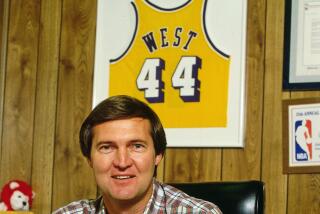West Virginia’s Catlett Thinking of Retirement
- Share via
MORGANTOWN, W.Va. — Gale Catlett didn’t give much thought to coaching when he graduated from West Virginia in 1963. But on the way to law school, Catlett found himself a new career.
Now, 23 years later and West Virginia’s winningest basketball coach, Catlett, 45, is thinking of retirement.
“I really didn’t want to coach,” he said. “I was headed for law school at the university here after graduation. A friend of mine who was coaching at VPI called and said, ‘You ought to go into coaching.’ I said I hadn’t given it any thought.”
The friend called then-Richmond Coach Lewis Mills and recommended Catlett as an assistant. For Catlett, it was a matter of trying it and if he didn’t like it, he’d enroll in law school.
Coaching grew on Catlett. He spent two years at Richmond, two at Davidson, four at Kansas and one as an assistant to Adolph Rupp at Kentucky before he got his first head coaching job at Cincinnati in 1972.
Catlett became head coach at his alma mater in 1978. With five straight 20-win seasons and several NCAA and NIT tournament appearances to his credit, Catlett sported a 158-75 record going into the end of January.
“I never thought that I would be in coaching this long,” said Catlett, who has a “roll-over” contract which renews each summer for four more years. “College coaching is a very tenuous and sporadic situation. I didn’t have time in my coaching career to worry whether you have a job one year to the next.”
Catlett said he’s been contacted “probably 20 times” in the past eight years by other colleges and pro teams, but his deal at West Virginia, augmented by an annuity that reportedly boosts his salary above $100,000 annually, is simply too good to leave.
“I probably will retire from this job,” he said, noting he would be “shocked” to still be coaching when he turns 50, and may make his move as early as two years from now.
Catlett’s career has not been without its crises. He left Cincinnati under a cloud over recruiting violations that landed the school on probation, and he had to face the critics when five players were implicated last semester in an alleged sexual attack on a 17-year-old female freshman.
Catlett felt the sting of both incidents, saying he would have stayed and fought the probation at Cincinnati if he had to do it over again and feels the media made victims of his West Virginia players, who were never indicted but disciplined by the school.
While Catlett’s most idolized mentor, Rupp, coached for 42 years, he said those days of longevity may be gone forever. “First of all, there’s so much pressure to win every year that I don’t think coaches can do that and, No. 2, I think there’s such a demand on your time that you can’t physically--healthwise--stay up on all of that.
“I think you’ll see people coaching for maybe 10 years then getting out,” he said. “I think today we have a lot different situation. At West Virginia, we’re under a microscope and everything you say and do is very carefully analyzed so you have to be a bit more careful here (than in states with several colleges or universities).”
Recent edicts by the NCAA on minimum grade requirements and mandatory drug testing meet with Catlett’s general approval.
“It’s going to be quite a shakeup, though, in college athletics,” he said of the grade rules. “I think this is even going to be a shocking adjustment the next two or three years . . . more so than the fans understand and more so than maybe some of the administration that put it in understand.”
West Virginia, as do many other schools, already had drug testing programs in place prior to this year’s NCAA convention.
“We’re not trying to catch someone, but we are trying to have a testing program so that the young people understand that if they do put a substance in their body, they could lose their scholarship,” he said.
Catlett dismisses the notion that college athletes are the only one who need more than the traditional four years to complete their degree work.
“I think college students (in general) do,” he said. “I don’t know of too many college students who get their degree in four years, I couldn’t get mine in four years and I was a fairly good student.
“I think there’s too much emphasis saying, ‘Does an athlete need five years?’ The key thing is to get his degree, regardless.”
The statistics of those not making it into pro sports must be impressed upon high school and college athletes to better stress the need for education, said Catlett.
He noted there are about 600,000 boys playing high school basketball today and only about 40 players break into the pros each year. Even those few who make it professionally find, he said, that, on the average, their careers ended by the time they are 29.
More to Read
Go beyond the scoreboard
Get the latest on L.A.'s teams in the daily Sports Report newsletter.
You may occasionally receive promotional content from the Los Angeles Times.










